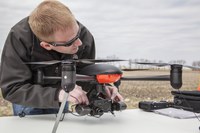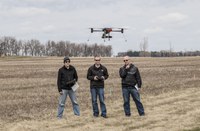NDSU Evaluating Unmanned Aircraft System Technology
(Click an image below to view a high-resolution image that can be downloaded)
-

Trevor Woods of the UND Center for Unmanned Aircraft Systems Research, Education and Training is checking the camera on an unmanned aircraft system that's being used in a research project at NDSU's Carrington Research Extension Center. (NDSU photo) -

Jakee Stoltz (left), Trevor Woods (center) and Logan Lass of UND's Center for Unmanned Aircraft Systems Research, Education and Training are conducting a test flight of an unmanned aircraft system as part of a research project at NDSU's Carrington Research Extension Center. (NDSU photo)
North Dakota State University researchers are taking to the air to monitor crop and livestock research projects on the ground.
Several researchers on campus are working with colleagues at NDSU’s Carrington Research Extension Center to evaluate whether unmanned aircraft systems (UAS) can be effective management tools in crop and livestock production.
“There is currently much interest in using UAS in agriculture,” says John Nowatzki, the NDSU Extension Service’s agricultural machine systems specialist and the lead investigator on this project. “However, there is little research to show that UAS can be used effectively or economically for crop or livestock management.”
Researchers are using UAS-mounted thermal, infrared sensors and cameras that capture image data at specific frequencies to collect data from fields and livestock at specified times.
The researchers plan to identify plant emergence and populations in corn, soybeans and sunflowers, and nitrogen deficiencies in corn and wheat. They’re also hoping the UAS can help them make early plant health assessments, and spot disease and insect damage symptoms, weed infestations and indications of moisture stress on irrigated crops.
In addition, they plan to use the UAS to determine the impacts of tillage and crop rotations on crop emergence, vigor and yield, and the impacts of soil salinity on crop yields, as well as monitor the dry-down times of individual corn hybrids to determine when to harvest the crops.
“The objective is to find out which observations taken from the plane can translate into immediate management actions, or possibly some observations may lead to corrective action for the following season,” says NDSU professor and Extension agronomist Hans Kandel, who is one of the project’s co-investigators.
Crop production researchers have identified at least 40 research trials at the Carrington center they want included in the UAS project, according to Blaine Schatz, the center’s director.
“On the livestock side of our research efforts, we will mostly be observing the beef cattle within multiple projects, and the observations will focus on capturing images that may help to determine animal health contrasts and animal behavior patterns,” Schatz says.
For example, researchers plan to monitor the breeding activity of the center’s beef cattle, count the cattle in pastures to make sure they are where they are supposed to be, detect animals that are ill so they can be isolated from the rest of the herd and treated as quickly as possible, and identify animals that are aggressive toward other livestock or humans so they can be removed from herds.
The researchers also intend to monitor animal temperatures and determine the feedlot surface temperatures of various bedding materials to mitigate stress from extreme weather conditions.
“The individual NDSU Carrington Research Extension Center researchers will collaborate with project principal investigators to select appropriate sensors and monitoring schedules for their projects,” Nowatzki says. “These researchers also will collaborate with ABEN (NDSU Agricultural and Biosystems Engineering Department) personnel to correlate the UAS-sensed data with the data collected on the ground for each project.”
The first UAS flights were on May 5. The Federal Aviation Administration gave North Dakota approval in April for the UAS test flights.
A Research ND grant from the North Dakota Department of Commerce and a North Dakota Soybean Council research grant funded the project, Nowatzki says. The Research ND grant includes matching funds from two private-sector partners: the North Dakota Corn Council and LW Survey of Duluth, Minn.
The University of North Dakota’s Center for Unmanned Aircraft Systems Research, Education and Training is collaborating on this research by flying the UAS at the Carrington center. UND also will collect flight information from each flight of both UAS used in the project. The flight information will be shared with the FAA for its use in developing future UAS regulations.
In addition to finding out whether UAS are effective in monitoring crop and livestock production, the researchers plan to develop methods to convert the image data to information that’s useful to producers and crop consultants, and help producers identify how they can make use of UAS on their operations.
“The major benefit of UAS is that it offers a very affordable technology that the farmers or consultants can easily adopt,” says Sreekala Bajwa, NDSU ABEN chair and a UAS project co-investigator whose expertise is in remote sensing for precision agriculture. “It offers the flexibility that you can fly it anytime and at any area of interest with the proper safety regulations in place.”
She thinks another huge advantage is that UAS potentially could cover a whole farm in a day or a few days and provide the producer with a visual of his or her entire field.
“Monitoring the entire farm is a very time- and labor-intensive job,” she notes. “It is virtually impossible to look at all the field, even when a consultant is walking the fields. A UAS will allow the farmer or consultant to identify potential areas of concern and focus on those areas which may otherwise go undetected.”
Bajwa believes this one-year project is just the beginning.
“With our current research project, we are only touching the surface of possibilities,” she says. “Many researchers at NDSU are working in areas that can benefit from data collected from a UAS platform. I hope to see many more researchers taking active roles to capture this opportunity to address a research potential in their area of interest and, thus, positively impacting our state, region and nation in a significant way.”
NDSU Agriculture Communication - June 19, 2014
| Source: | John Nowatzki, (701) 231-8213, john.nowatzki@ndsu.edu |
|---|---|
| Source: | Sreekala Bajwa, (701) 231-7265, sreekala.bajwa@ndsu.edu |
| Editor: | Ellen Crawford, (701) 231-5391, ellen.crawford@ndsu.edu |

